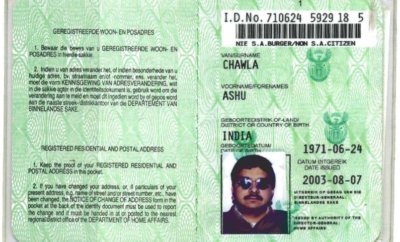Business
Indian Companies Invested Over $4 Billion in South Africa: Report

Aerial view of business district of Johannesburg with South African flag painted on structure walls.
Photo: Bigstock
Indian companies have created around 18,000 jobs in South Africa and are focusing on sustainable development in the country, according to a CII- PwC report.
More than a hundred Indian companies have have invested more than $4 billion and created 18,000 direct jobs in South Africa, according to a report released by the Confederation of Indian Industries (CII) and PricewaterhouseCoopers (PwC). The report, titled “Indian Industry’s Inclusive Footprint in South Africa – Doing Business, Doing Good,” also said that Indian companies in South Africa are not just investing funds and creating jobs, but are contributing in the upliftment of the communities in which they operate.
The report showcased the contribution of 150 Indian companies beyond foreign direct investment (FDI) in South Africa, including key corporate social responsibility (CSR) and skill development initiatives.
“Leading Indian companies such as Wipro, Coal India, Cipla, Jindal Steel and Power, Mahindra and Mahindra have recently made investments in South Africa,” said CII in the report.
“As this report outlines, Indian companies are demonstrating their commitment to sustainable development in South Africa across education and healthcare schemes to job creation, agricultural projects and empowering women,” Dion Shango, senior regional partner & CEO, PwC Southern Africa, said.
Indian companies have made significant investments in healthcare and pharmaceuticals, IT, automobile industry and finance.
Indian companies in the IT sector are transferring skills to South Africans by equipping them with the skills necessary to deliver locally, instead of employing a large expatriate population from India, according to the report. The companies have also set up training centers to facilitate exchange programs between India and South Africa for IT graduates.
Tata Consultancy Services (TCS), for instance, has sponsored 52 students who were sent to India for IT courses. Of these, 37 have been absorbed by TCS and seven are still in training in India, according to the report.
Bilateral trade between India and South Africa has increased from $2.5 billion in 2003-04 to $11.79 billion in 2014-15, the report states. However, there was a decline in trade in 2015-16, when it fell from $11.79 billion to $9.5 billion. According to the report, the reason for the decline was a credit rating downgrade of South Africa, policy uncertainty, political and economic uncertainty as well as exchange rate fluctuations.
India exports vehicle parts, transport equipment, drugs and pharmaceuticals, engineering goods, footwear, chemicals, textiles and rice to South Africa. Exports from South Africa to India include gold, steam coal, copper ores and concentrates, phosphoric acid, manganese ore, aluminium ingots and other minerals.
The report also added that the entry of Indian pharma companies such as Ranbaxy and Cipla reduced the cost of anti-retroviral drugs (ARVs) in South Africa drastically and saved thousands of lives. While the treatment for HIV was earlier out of reach for almost everyone in the developing world, treatment in South Africa today costs less than $1 a day and has reached 4 million South Africans.




You must be logged in to post a comment Login